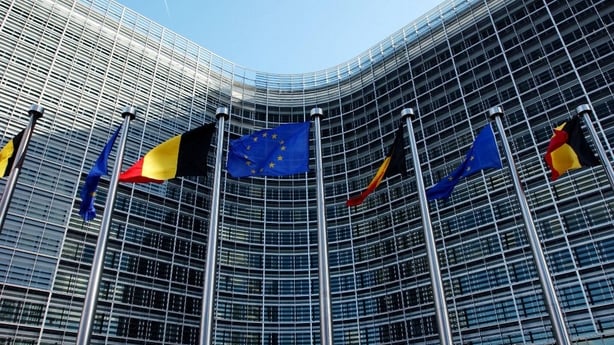Europe's economy is increasingly feeling the heat from Russia's war in Ukraine as growth stalls, confidence plummets and inflation soars, data and warnings from policymakers made clear today.
Sanctions on Russia following its invasion last month have pushed energy prices to record highs across the continent.
This is sapping confidence and has raised the risk of another recession, even before some states have recovered from a COVID-fuelled downturn.
Germany, the bloc's biggest economy and one of the most reliant on Russian energy, will be among the hardest hit and the government's council of economic advisers today more than halved their growth forecast for this year to 1.8%.
"The risk of a recession is substantial," Volker Wieland, one of the panel's members said, adding the economy would now take until the third quarter to return to its pre-pandemic size.
The advisers, whose forecasts guide the government in setting fiscal policy, also predicted that German inflation would double to over 6%.
As the government triggered an emergency plan for possible gas rationing should supplies from Russia be disrupted or stopped, Wieland said Germany should work to end its dependence on Russian energy, possibly through a longer-than-anticipated nuclear energy programme.
This would push up inflation for now but improve the long-term security of the country and the economy's stability, he said.
European Central Bank President Christine Lagarde also warned that, as the conflict drags on, Europe's economy could suffer more than feared just a few weeks ago.
"The longer the war lasts, the higher the economic costs will be and the greater the likelihood we end up in more adverse scenarios," she said in a speech.
In Vienna, Austria's central bank cut its growth forecast and sharply raised its inflation outlook for this year, saying its new predictions would worsen further if the war dragged on.
Christine Lagarde said households were already becoming more pessimistic and businesses could soon be postponing investment.
Her warning was underlined by a sentiment indicator that showed the war had sent consumer confidence in the euro zone plummeting and inflation expectations to record highs.
The European Commission's economic sentiment index dropped to 108.5 in March from a downwardly revised 113.9 in February, while consumer confidence plunged to -18.7 from -8.8.

The biggest hit to confidence came from inflation, which is sapping consumer spending power, even as governments quickly roll out subsidies to ease some of the pain.
In Spain, one of the bloc's biggest economies, inflation accelerated to 9.8% in March, the fastest pace since May 1985, from 7.6% in February.
Stagnating growth coupled with high inflation - stagflation in economic jargon - leaves Lagarde's ECB in a dilemma.
While the central bank would normally tighten policy to fight inflation, such a move could exacerbate a recession, hurting consumers even more.
To mitigate the risk, Lagarde promised to move only by small increments, without making longer-term commitments.
"Gradualism means that we will move carefully and adjust our policy as we receive feedback on our actions," she said.
This policy dilemma could in turn divide the ECB's rate setting Governing Council even more, as conservatives are already calling for a hike to combat high inflation.
"Unless the war becomes a global conflict, then I think that the first rise could come towards the end of this year," ECB policymaker Peter Kazimir said.
Earlier figures showed that euro zone economic sentiment fell sharply in March, as Russia's invasion of Ukraine sent consumer confidence plummeting and their inflation expectations to record highs.
The European Commission's economic sentiment index for the 19 countries sharing the euro dropped to 108.5 in March from a downwardly revised 113.9 in February.
Economists polled by Reuters had expected a decline to 109.0 points.
Consumer confidence was the hardest hit, plunging to -18.7 in March from -8.8 in February, while sentiment in industry fell to 10.4 from 14.1.
Confidence in the retail sector also suffered, declining to 0.2 in March from 5.5 in February.
Only the services sector was more optimistic with the reading improving to 14.4 from 12.9, data showed.
Selling price expectations among manufacturers rose to a record high for the survey going back to 2000, of 58.1 in March from 49.8 in February.
Consumer inflation expectations also rocketed to the highest ever value, reaching 59.8 points against 37.7 in February, today's index also shows.

